I woke up this morning trying to hang on to a fragment of my dream, remembering only that I was with my family at an unfamiliar cottage on a large body of water feeling lucky that the strangers outside let us use it, while noting that, as kitchens go, there wasn’t one. My daughter wanted to make pumpkin pies and I found two disposable pie pans in the cupboard, but no oven to bake them in. That was it. That was all I could remember.
But as I was thinking about it, I realized that my dreams involve locations that are never the same but are always — I mean always — at water’s edge. I am never inland in my dreams.
I laughed out loud.
Except for the year we lived on the Mojave Desert in California, I’ve lived around water all of my life. I loved the high desert and the people in it, but I found my ‘water fix’, even then, at a woodsy oasis a few miles from our house. A river ran through it.
We’ve lived in a small one-bedroom ocean-front in Ventura, California, and spent two years on Maui in three different houses, two of them at the ocean, one in sight of it. We worked in the city for 32 years but managed frequent R&Rs at our small cottage on a small lake, until we sold it and retired to the island. There was never any question about where we would have to live: We would have to live near water.
I was born in the center of that spit of land jutting into Lake Superior known as the Keweenaw Peninsula. I’ve spent all but a few years in Michigan, where you’re never more than six miles from a body of water and never more than 85 miles from one of the Great Lakes. Michigan is the land of lighthouses. At 140 we have the most of any state in the country. We have more than 11,000 inland lakes and 3300 miles of shoreline.
Water is our everything. Which makes what happened to the water in Flint all the more egregious. How could this happen in Michigan? Would it have happened in an all-white community? The nightmarish answer is ‘no’.
There, I got that out of the way.
Water is my everything. Detroit was my home growing up but my summers, from the days after school let out to Labor Day, belonged to that peninsula surrounded on three sides by Lake Superior. My aunt and uncle had a camp on its shores and we spent most of our time there. It was rustic and wonderful, but we had no electricity and no running water. Gas lamps provided light and a huge stone fireplace provided heat, and water for cooking and drinking had to be hauled from the lake, up the bank to the cabin.
We children, my cousins and I, had one job: hauling water. Every summer morning we trudged barefoot over the smooth, round stones to the lake’s edge and dropped our pails into the clear, ice cold water. We carried long-handled dippers so we could drink from the lake before we began. The icy water hitting our warm insides gave us delicious shivers.
(Was it safe to drink? Am I here to tell the tale?)
I saw that mighty lake in its many moods; from smooth and serene to its awesome violent fury. I felt the earth move when storm-wracked waves building up in that vast expanse crashed as breakers mere feet away, thrilling and terrifying me. For years afterward I had the same dream over and over: I was trying to outrun a wave arcing high over my head and I couldn’t run fast enough. I would awaken just before it hit.
For the past 25 years I’ve lived on an island 20 miles long and 10 miles wide. Our cottage home is on a quiet bay that leads to a Great Lake that hooks to another Great Lake and then to another that leads to a seaway that opens up at the Atlantic Ocean. And then the world.
Ocean-going vessels, called ‘salties’ on the Great Lakes, ply the channel-crossing where our ferry takes us from the island to the mainland. I took this picture from the deck of the ferry. The small boat approaching is the pilot boat, there to deliver a savvy local escort who will guide the salty through a hard-to-navigate channel and then send it on its way to the Soo Locks, and on to Lake Superior.
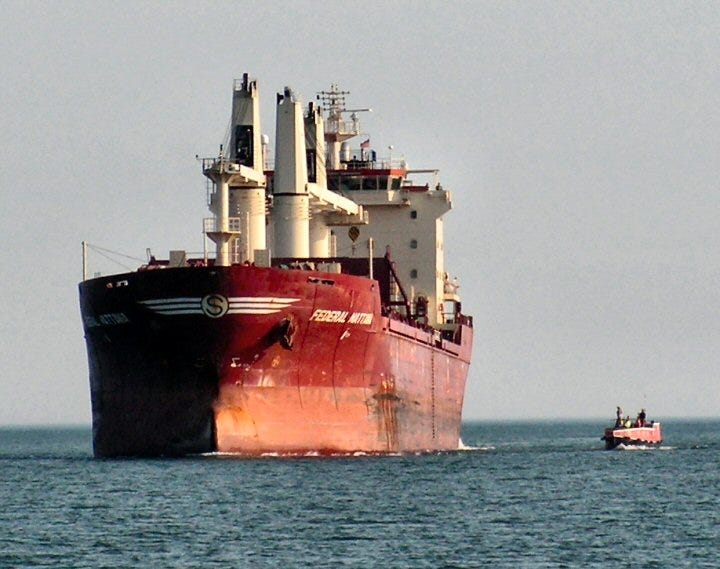
I marvel at the opportunity I’d have available to me if only I could manage it: I could sail from my own back yard to the ocean without ever hitting dry land.
When we leave our island to work our way south for the winter, we head like a fish out of water for the ocean — and the ocean never fails to satisfy.
I don’t swim well. I get seasick on boats. But put me on a shore looking out over water and my senses come alive. I see dolphins at the ocean and I want to know where they’re going and what they’re thinking. Is it essential that they leap out of the water or are they doing it just for me?
Back on the island, there isn’t a seagull in the sky until the fishermen next door throw out the fish guts. Then they come from nowhere, screaming like banshees, churning the water until the meal is over.
A heron lands near our northern shore and stands on one leg, motionless for many minutes, seemingly unaware and definitely not working — until that fish swims by or that crawfish surfaces, and pow! He’s on it. (We watched one land gracefully on the water just as the sun was setting, and the beauty of it left us breathless — until it dipped its beak into the water and came up with an impaled water snake, which it then proceeded to swallow whole.)
There are other places for other people but my place is by the water. In my life and in my dreams. There will come a time when my sojourn at the shore will come to an end. I’m feeling it already. But when that time comes I’ll pull out the many thousands of pictures I’ve taken over the years and I’ll be there.
I’ll always be there.

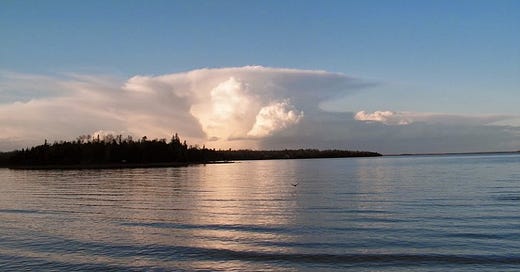



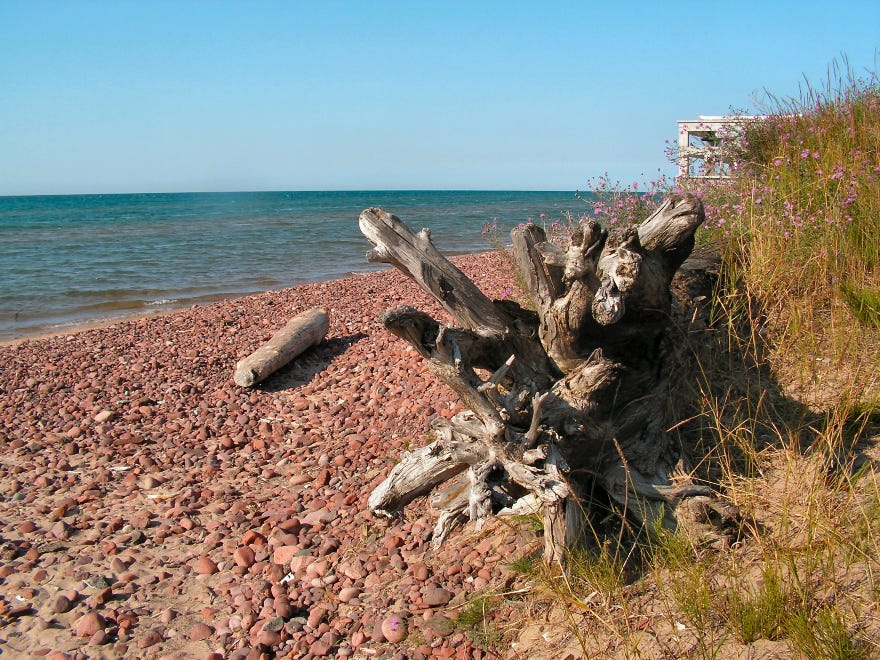
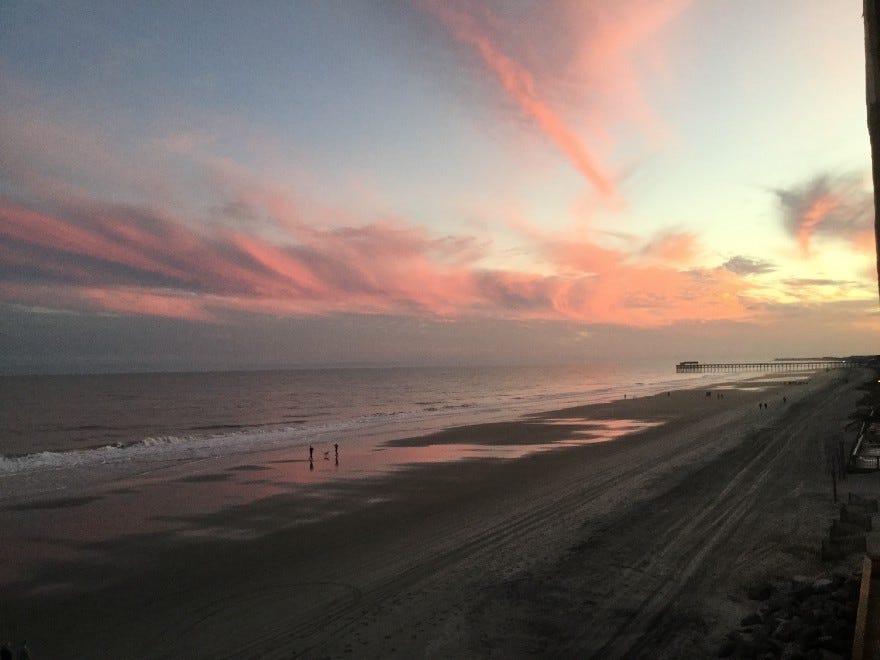
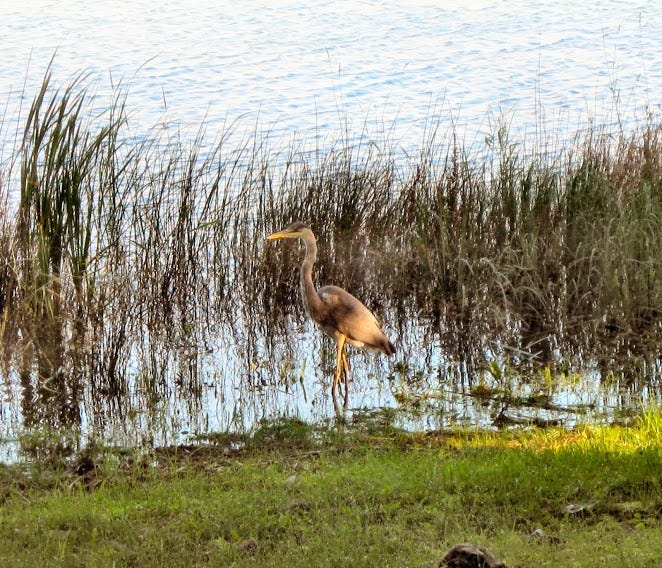
Yes! Water captures my soul and my soul has to have it! My husband, at age seven, sailed with parents from Sheboygan WI to Haiti. Has lived aboard much of his life. Addicted.
THE DOLPHINS! I wrote a piece wondering if they jump for the pure joy of it or...? I love them on the bow waves of our vessel. They will always meet your eyes.
Your passions are impressive.
Hope it's a wonderful cruise!
J
Ah, Maui No Ka Oi. Three years teaching there, learning, loving, leaving.After school, if Haleakala was clear, I would drive my little VDub up to watch the sunset, and if I was lucky, the moon rise over Mauna Kea. Most weekends I'd head to Lahaina side with a book and my mat to read and nap on the each. There were so many little spots that I would visit - the streams near Iao Needle, the road to Hana and the Seven Pools, th public beaches (that have now disappeared) in Kihei, from Kahalui around the northern tip of the island and the same from Hana around to Kula and a stop for Portuguese Bean Soup. It's so special, and once we ar further along toward a safer end of the pandemic, I'm headed back. In the meantime, I no longer can drive, so I am dependent on the kindness of strangers and the buses to get to the shores of Lake Champlain, to just sit. There are a lot of private places along the shoreline that if I still drove, I could get to...and I will. I have to plan and that makes it all the sweeter. Thanks for your great memory.